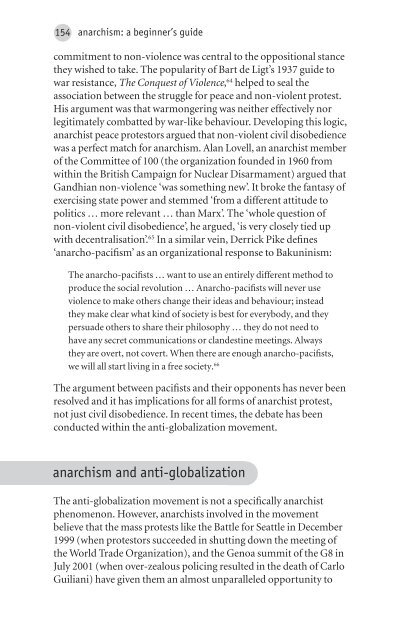o_195qg5dto17o4rbc85q1ge61i84a.pdf
You also want an ePaper? Increase the reach of your titles
YUMPU automatically turns print PDFs into web optimized ePapers that Google loves.
154<br />
anarchism: a beginner’s guide<br />
commitment to non-violence was central to the oppositional stance<br />
they wished to take. The popularity of Bart de Ligt’s 1937 guide to<br />
war resistance, The Conquest of Violence, 64 helped to seal the<br />
association between the struggle for peace and non-violent protest.<br />
His argument was that warmongering was neither effectively nor<br />
legitimately combatted by war-like behaviour. Developing this logic,<br />
anarchist peace protestors argued that non-violent civil disobedience<br />
was a perfect match for anarchism. Alan Lovell, an anarchist member<br />
of the Committee of 100 (the organization founded in 1960 from<br />
within the British Campaign for Nuclear Disarmament) argued that<br />
Gandhian non-violence ‘was something new’. It broke the fantasy of<br />
exercising state power and stemmed ‘from a different attitude to<br />
politics … more relevant … than Marx’. The ‘whole question of<br />
non-violent civil disobedience’, he argued, ‘is very closely tied up<br />
with decentralisation’. 65 In a similar vein, Derrick Pike defines<br />
‘anarcho-pacifism’ as an organizational response to Bakuninism:<br />
The anarcho-pacifists … want to use an entirely different method to<br />
produce the social revolution … Anarcho-pacifists will never use<br />
violence to make others change their ideas and behaviour; instead<br />
they make clear what kind of society is best for everybody, and they<br />
persuade others to share their philosophy … they do not need to<br />
have any secret communications or clandestine meetings. Always<br />
they are overt, not covert. When there are enough anarcho-pacifists,<br />
we will all start living in a free society. 66<br />
The argument between pacifists and their opponents has never been<br />
resolved and it has implications for all forms of anarchist protest,<br />
not just civil disobedience. In recent times, the debate has been<br />
conducted within the anti-globalization movement.<br />
anarchism and anti-globalization<br />
The anti-globalization movement is not a specifically anarchist<br />
phenomenon. However, anarchists involved in the movement<br />
believe that the mass protests like the Battle for Seattle in December<br />
1999 (when protestors succeeded in shutting down the meeting of<br />
the World Trade Organization), and the Genoa summit of the G8 in<br />
July 2001 (when over-zealous policing resulted in the death of Carlo<br />
Guiliani) have given them an almost unparalleled opportunity to




